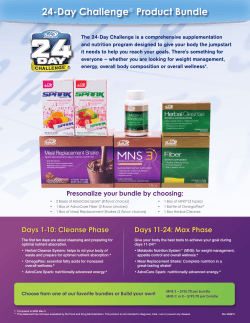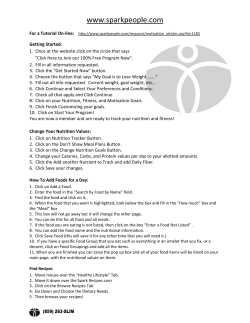
PART III – NUTRITION PLANNING A. Meal Planning
PART III – NUTRITION PLANNING A. Meal Planning Pre-planning your weekly meals into a daily menu is the best method to enable you to grocery shop for the proper food items and have them in your household in advance. Therefore, you need to bring a shopping list to the store with you and stick to that list. Creating a weekly menu plan will keep you out of the aisles which have the foods you should avoid and keep you from over buying perishables which will have to be thrown away if not eaten and thereby wasting money. There are different philosophies as to which type of meal plan to use. Here is a sample of some of those: Three main meals a day with small snacks in between each meal and one snack before bed Six small meals a day which are eaten every 2 to 3 hours throughout the day and no eating after dinner time A heavy meal first thing upon waking, then gradually reduce your lunch and dinner, with no snacks Minimalist, with one large meal a day (not recommended for any athlete) Either of the first three could work for an athlete, as long as the correct nutrients in the correct portion sizes are eaten. I don’t recommend the minimalist approach for anyone living an active or athletic lifestyle. In my opinion, balance is the key and I think the first two meal plans listed above serve the best purposes for an active lifestyle. Over the years I’ve tried the different methods set forth above for myself. For the majority of people whom I’ve helped assemble meal programs, they’ve had the most success on the first two methods. What I’ve found is that as long as a person plans their meals as discussed herein and sets reasonable, short term goals, they will succeed. However, for those people who fail at their nutrition, there are some common factors such as (a) lack of knowledge, (b) lack of planning (see above), (c) lack of will power (creating good habits), and (d) lack of realistic, short term goals. For anyone who has never tried to do a nutrition plan, or needs to redo their current nutrition plan, or has plateaued with their nutrition, I recommend the AdvoCare 24 Day Challenge to them. The 24 Day Challenge nutrition program is designed around a breakfast, lunch and dinner scheme with a snack in between each meal. The 24 Day Challenge is an excellent way to kick start your metabolism and learn how to begin living a lifestyle that includes healthy eating and exercise. The 24 Day Challenge is a two phase system. The first phase is a 10 day herbal cleanse to restore your digestive timing and remove the toxins from your body’s filters. The second phase is the intake of high quality vitamins in the MAX Nutrition System, which include a probiotic, calcium, multi-vitamin, vitamin E, mild appetite control and energy boost and B-vitamin drink. The MNS vitamin packs will help fill in the gaps or provide the nutrition that isn’t present in your food sources (See Part I regarding supplementation). During both phases you will use the nutrition guide provided with your plan for healthy eating. The guide provides information that includes a list of some of the best foods to eat and in what portion size. The guide also lists the worst items for you to consume. There are meal recipes also on the web-site of the distributor where you purchased it and the distributor (like me) whom you bought your Challenge from is also there to provide guidance and coaching. The maintenance plan after the 24th day is to continue following the nutrition guide and use the MNS vitamin packs and any of the other great products, like the Spark Vitamin drink or the meal replacements. Here is a link to a short video explaining the program: http://24daychallengemovie.com/ To order the 24 Day Challenge, click this link: https://www.advocare.com/13057167/24DayChallenge/default.aspx Below is a link to the nutrition plan that comes with your 24 Day Challenge: http://advocarecorporate.s3.amazonaws.com/corporate/24daychallenge/24DayChallenge-Daily-Guide.pdf Because different people have different goals in regards to nutrition (e.g., weight loss, general health, weight gain, etc.) the below website offers a variety of plans and nutrition information should you decide to utilize the 24 Day Challenge: www.choosethechallenge.com Below is an example of a general nutrition plan for someone trying to maintain muscle strength and mass during periods of heavy training while keeping their body fat at a healthy level. Quantities of protein, fats and carbohydrates will need to be tailored for each individual based on age and weight. You should always check with a physician before changing your diet habits. BREAKFAST Protein Complex Carb Good Fat 1 piece of Fruit/berries Vegetable Sample -Whole eggs, plus egg whites -1 slice whole wheat bread or (1 cup plain steel cut or mothers oats) SNACK Protein -Nutri-bullet Shake: 2 cups of spinach, ½ avocado, slice of lemon, ¼ cup of blueberries. /Or Plain Almonds Sample -Non- fat plain Greek yogurt LUNCH Protein Good Fat Vegetable Sample PRE-WORKOUT Complex Carbohydrate (if necessary) Sample -Banana POST-WORKOUT Simple Carbohydrate Protein Or see AdvoCare Post-workout Recovery for both Sample -Honey DINNER Protein Vegetable Complex Carbohydrate SNACK Protein or vegetable Sample - Chicken Breast -Green vegetable -Small Yam or sweet potato Sample -No-fat cottage cheese or Plain almonds -Skim milk -Small plain sweet potato -Celery or Kale chips -Tuna or salmon (low sodium in water) or carved turkey (white meat) -Green salad with vegetables -1 tablespoon olive oil and red vinegar AdvoCare Product to accompany nutrition AdvoCare Product to accompany nutrition AdvoCare Product to accompany nutrition AdvoCare Product to accompany nutrition AdvoCare Product to accompany nutrition AdvoCare Product to accompany nutrition Catalyst Meal Replacement Shake (in lieu of above meal) Remainder of MNS MAX 3 Meal Replacement Shake (in lieu of above meal) Muscle Gain protein shake or Pro 20 protein drink Post-workout Recovery Drink Shake and a scoop Of Muscle Gain Catalyst Nighttime Recovery MNS Max 3 - 02 Gold -3 Catalysts Spark or V-16 (caffeine free) The above plan is merely an example. There are a variety of substitutions for the food items that can be made (look back at Parts I and II for reference to the best and worst foods to consume). Also included in the above chart are some of the products AdvoCare offers to supplement your daily nutrition needs. The reference to the Nutribullet® is not an endorsement of the product. The Nutribullet® is just one example of a blender product that will liquefy fruits and vegetables into a convenient smoothie. You can purchase one at any department store or on line. Below is an image of a Nutribullet®. Making your vegetables and fruits into smoothies is an easy and efficient way to get the nutrients into your body. B. Food Journal – A food journal is the best way to track eating habits. It’s as simple as writing EVERYTHING down that you consume and put in your body and in what quantities. You then tally up the nutrient values, such as calories, proteins, carbohydrates, fats, sodium, etc., which you are interested in controlling. However, with the advent of computers, the internet and smart phones, it is easier than ever to create a food journal without pen to paper. I like the SparkPeople.com® website or My Fitness Pal app®. These allow you to either manually enter the information or scan UPC codes and just enter the quantity. It only takes seconds to have your calculations of your daily nutrition and nutrition goal at your finger-tips. C. Supplementing your Daily Nutrition - Here are the links to the AdvoCare product pages for the products referenced above in the meal plan (e-mail me at mackall@advocaregetbetter.com for more information): MNSMax 3: https://www.advocare.com/Microsite/Images/Store/Labels/T1131.pdf Catalyst: https://www.advocare.com/Microsite/Images/Store/Labels/T2010.pdf Catalyst™ Amino Acid Supplement is a blend of essential branched-chain amino acids and L-glutamine that supplies your body with muscle-building components and sustains your muscles during exercise and reduced calorie intake.* Whether you're trying to lose weight or gain muscle, Catalyst helps repair and protect muscles.* And it works great in conjunction with other AdvoCare® products like Spark™ Energy Drink and one of the Metabolic Nutrition Systems (MNS®). Other amino acids in Catalyst like L-arginine, taurine and betaine help fuel and maintain your muscles to support endurance and strength.* Combined with a healthy diet and exercise, Catalyst helps you retain muscle and reduce fat for a more toned and better defined look.* Spark: https://www.advocare.com/Microsite/Images/Store/Labels/A2093.pdf AdvoCare Spark® Energy Drink mix is a unique multi-nutrient system that's designed to provide nutritionally advanced, longlasting energy and enhanced mental focus.* Its 21 vitamins, minerals and nutrients work synergistically to give you healthy, balanced energy without making you jittery like other caffeinated beverages.* Spark's unique combination of ingredients gives you fast-acting energy and B-vitamins enhance your body's natural energysustaining processes.* For mental focus and clarity, the neuroactive amino acids in Spark help sharpen your mental focus and alertness by supporting your brain's ability to efficiently transmit messages within the nervous system.* With seven refreshing flavors and only 45 calories per serving, Spark gives you a lift that lasts for hours.* V-16: https://www.advocare.com/Microsite/Images/Store/Labels/A4372.pdf Similar to Spark without any caffeine. Meal Replacement Shakes: https://www.advocare.com/Microsite/Images/Store/Labels/T2191.pdf Available in Chocolate Mocha, Chocolate, Vanilla and Berry 24 grams of protein 5-6 grams of fiber 26 vitamins and minerals and only 220 calories Contains 50% of the daily value of calcium Muscle Gain: https://www.advocare.com/Microsite/Images/Store/Labels/P4602.pdf 25 grams of high-quality, easily digestible protein Pro 20: https://www.advocare.com/Microsite/Images/Store/Labels/P1094.pdf The 3 oz. bottle is packed with 20 grams of soluble hydrolyzed protein, which the body can absorb quickly, to support lean muscle mass.* Unlike many protein supplements, Pro 20 provides 200 mg of Alpha-GPC, helping increase strength, speed, agility, reaction time, and power and performance.* With just 140 calories, Pro 20 is also packed with B vitamins and electrolytes. The convenient and fast delivery of these superior ingredients facilitates recovery, helping provide increased, sustained energy.* Pro 20 can be used as a pre-workout supplement as well as a recovery product. Post-workout Recovery: https://www.advocare.com/Microsite/Images/Store/Labels/P3361.pdf Post-Workout Recovery Sports Drink contains more than 30 vitamins, minerals and other nutrients that support the muscles' metabolic processes in recovery and helps minimize occasional soreness after workouts. *This statement has not been evaluated by the Food and Drug Administration. This product is not intended to diagnose, treat, cure or prevent any disease. Nighttime Recovery: https://www.advocare.com/Microsite/Images/Store/Labels/P3201.pdf To enhance the benefit of your body's natural processes, Nighttime Recovery supplement incorporates a unique combination of adaptogens and other nutrients from around the world to allow your body to more effectively respond to the demands of physical activity.* It naturally supports the production of growth-related hormones, and it enhances energy production, helping the body sustain higher workloads before the onset of fatigue.* The adaptogens in Nighttime Recovery support the body's ability to respond to stress such as physical training.* *This statement has not been evaluated by the Food and Drug Administration. This product is not intended to diagnose, treat, cure or prevent any disease. D. Calories– How Much? A calorie is a unit of measure of heat. Without getting overly scientific, a nutritional calorie is a unit of measure for the amount of food to produce energy. The amount of calories a person needs during the day is often debated. First, no two people are physiologically the same, nor are their activity levels. Therefore, the amount of calories you need will depend on your lifestyle and your resting metabolism. Below is one chart that shows the RDA of calories a person of a certain weight should consume based on their activity level. As you can see from the chart, for a highly active person, you must maintain 15 to 17 calories just to maintain your present body weight. This chart doesn’t take into account your extra training or additional caloric intake to build and repair muscle from lifting weights or hours of strenuous practice. Below is an example of the additional calories you would need to maintain your muscle if you were doing heavy weightlifting work outs (Robert Kennedy, “Rock Hard! Supernutrition for Bodybuilders”, warner Books, Inc. 1987). (next discussion, nutrients)
© Copyright 2025
















